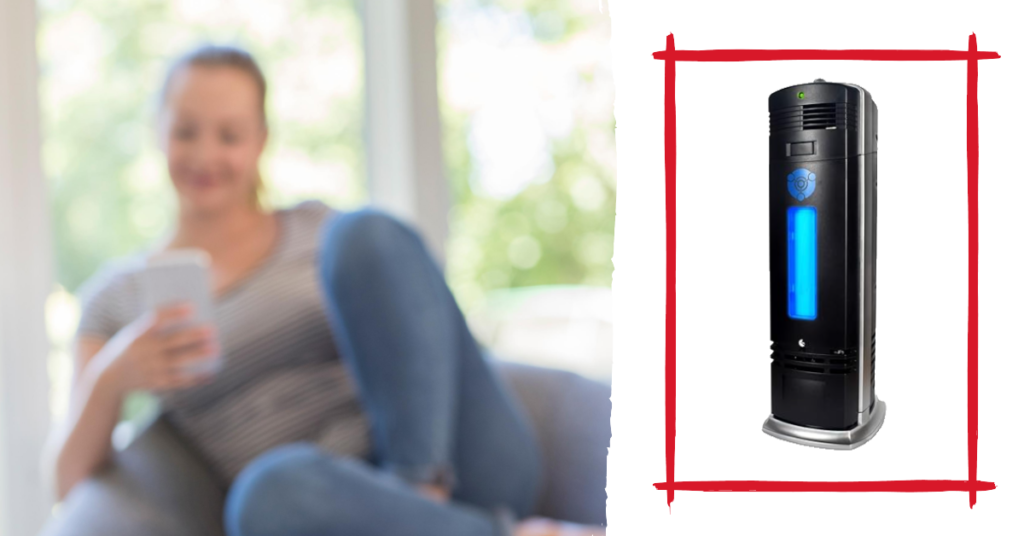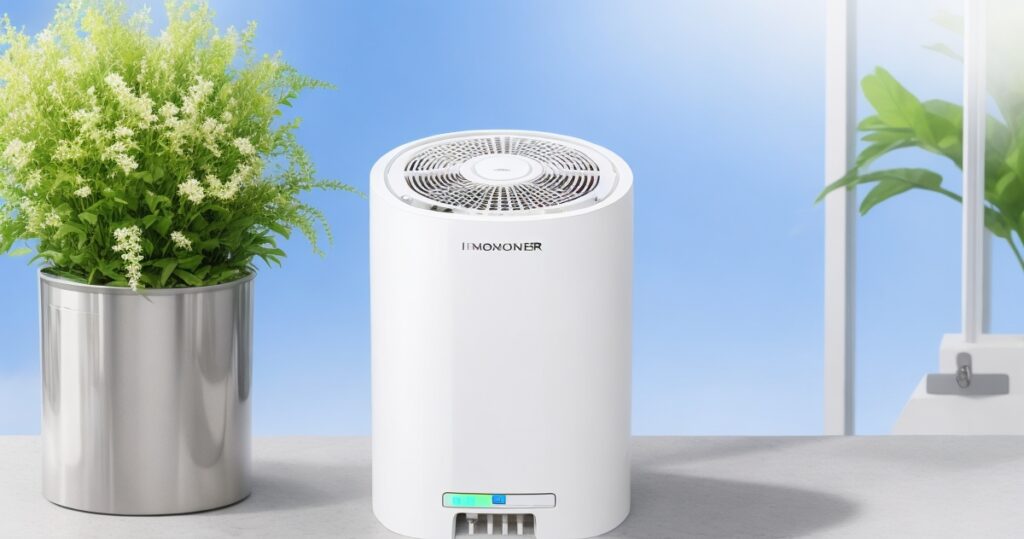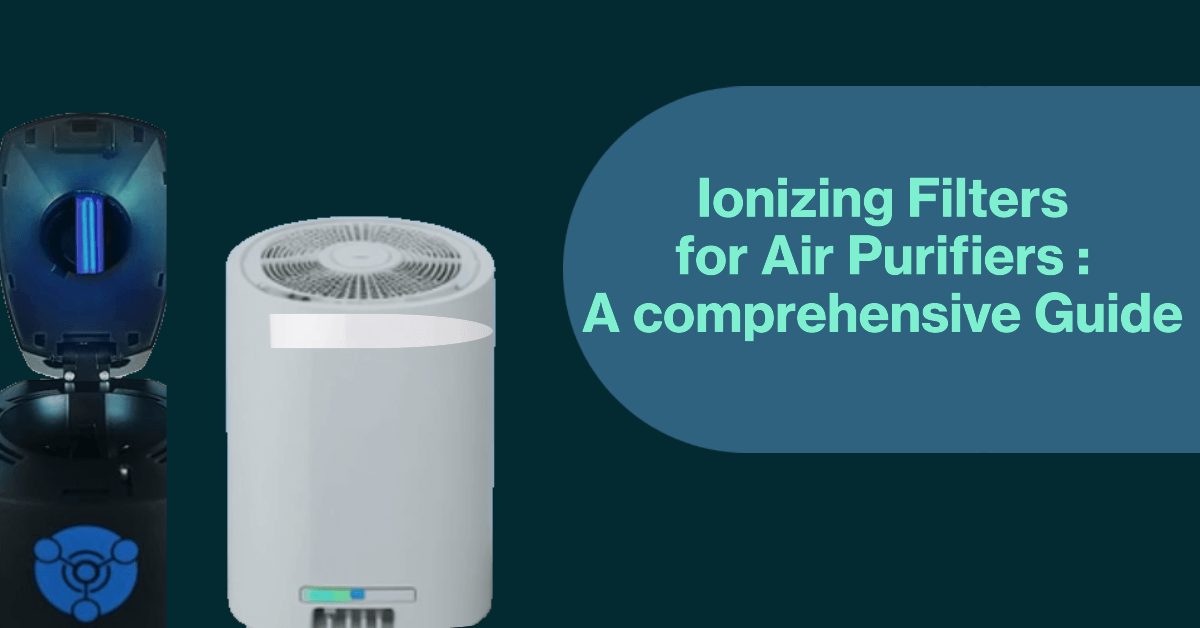Ionizing Filters for Air Purifiers are cutting-edge devices which employ advanced ionization technology to transform polluted air into a clean. Their mission? They help us to tackle airborne pollutants with a proactive approach, creating an environment where clean air isn’t just a luxury but a fundamental necessity for a healthier lifestyle.
As we go through the intricacies of air purification, it’s crucial to understand the significance of Ionizing Filters. These technological marvels actively release charged particles into the air, forming a magnetic field that attracts and eliminates a myriad of airborne threats. From dust particles to harmful microorganisms, Ionizing Filters go beyond traditional methods, offering a dynamic and efficient solution for maintaining air quality. The importance of this innovation extends far beyond the surface, delving into the very essence of a cleaner, more breathable living space.
In the pursuit of healthier living, Ionizing Filters emerge as the unsung heroes, addressing not only the visible particles but also the microscopic invaders that can impact respiratory health. Their benefits extend beyond mere purification; they encompass a holistic approach to well-being. In a world where air quality is often compromised, Ionizing Filters for Air Purifiers emerge as beacons of hope, ensuring that the air we breathe is not just clean but revitalizing.
Introduction
Welcome to the electrifying world of Ionizing Filters for Air Purifiers, where innovation meets a breath of fresh air. In this introduction, we’ll unravel the mystery behind ionizing filters and understand why they’re the superheroes in the realm of air purification.

A. What is an ionizing filter?
An ionizing filter is an innovative component in air purifiers designed to enhance the process of air purification. It actively releases charged ions into the air, creating a magnetic field that attracts and eliminates airborne particles, pollutants, and microorganisms. This dynamic approach sets ionizing filters apart, offering a proactive method for achieving cleaner and fresher indoor air.
B. Importance of Air Purification
In a world filled with pollutants, the importance of air purification cannot be overstated. Ionizing filters go beyond traditional methods, ensuring that the air you breathe is not just clean but ionized to perfection. Clean air isn’t a luxury; it’s a necessity for a healthier, happier life.
C. Positive and Negative Ions
Think of positive and negative ions as the dynamic duo, working together to create a harmonious atmosphere of purity. They attract and neutralize pollutants, ensuring that your air is a haven of freshness.
D. Benefits of Ionizing Filters
Ionizing filters for air purifiers offer comprehensive particle removal, actively releasing charged ions to attract and capture a diverse range of pollutants. Their proactive approach ensures continuous air purification, reducing allergens and neutralizing harmful microorganisms. This energy-efficient solution excels in odor elimination, providing a fresh and pleasant indoor environment. With long-term performance and the ability to sustain effectiveness over time, ionizing filters stand out as a versatile and durable choice for those prioritizing a proactive and efficient approach to maintaining healthier living spaces.

Other Air Purification Methods
The other air purification methods are:
A. HEPA Filters
HEPA filters act as diligent guardians, trapping even the tiniest airborne particles. Dust, pollen, and other microscopic invaders stand no chance against the meticulous filtration provided by HEPA filters.
B. Activated Carbon Filters
These filters absorb unwanted odors and chemicals elements with finesse, leaving your air not only clean but also free from any unpleasant scents.
C. UV-C Light Technology
Ultraviolet light, neutralize harmful microorganisms on the spot. It’s a microscopic battle where UV-C light ensures that your air is not just clean but also microbe-free.
Comparison with Traditional Filters
Effectiveness in Particle Removal: Ionizing filters and traditional filters, such as HEPA filters, differ in their approach to particle removal. While HEPA filters physically trap particles as air passes through, ionizing filters actively release charged ions to attract and capture particles. Ionizing filters, with their proactive method, can effectively remove a broader range of particles, including those of smaller sizes.
Handling of Different Types of Pollutants: Traditional filters, including HEPA and activated carbon filters, are specialized for specific pollutants. HEPA filters excel in trapping larger particles, while activated carbon filters are effective against odors and certain chemicals. On the other hand, ionizing filters address a wide spectrum of pollutants, from dust and allergens to bacteria and viruses, providing a comprehensive solution for overall air quality.
Long-Term Performance: Ionizing filters often showcase long-term performance advantages. Traditional filters, especially HEPA filters, may require regular replacements to maintain optimal efficiency. In contrast, ionizing filters, by actively capturing and eliminating particles, can sustain their performance over an extended period with proper maintenance, making them a cost-effective and durable choice.
| Comparison Aspect | Ionizing Filters | Traditional Filters |
|---|---|---|
| Effectiveness in Particle Removal | Actively attracts and captures a wider range of particles. | Effective in trapping particles but may have limitations in particle size. |
| Handling Different Types of Pollutants | Addresses various pollutants beyond the capabilities of traditional filters. | Each type of filter is specialized, handling specific pollutants. |
| Long-Term Performance | Ensures consistent and dynamic performance over time. | Effective but may require regular replacements for optimal performance. |
Health Impacts of Ionizing Filters
Let’s shift our focus to the health impacts of ionizing filters. They are not just air purifiers; they are health allies. The reduction in respiratory issues, allergy relief, and addressing potential concerns and controversies make ionizing filters a holistic solution.
- Reduction in Respiratory Issues: Ionizing filters actively improve respiratory health by eliminating harmful particles.
- Allergy Relief: Providing a breath of fresh air for those prone to allergies by reducing allergen presence.
- Potential Concerns and Controversies: Addressing and dispelling any doubts surrounding the use of ionizing filters.
With ionizing filters, it’s not just about clean air; it’s about nurturing a healthier and more comfortable living environment.
Mechanism of Ionizing Filters
The mechanism of ionizing filters is a fascinating journey into advanced air purification technology. Unlike traditional filters that rely solely on physical barriers, ionizing filters actively transform the composition of the air to create a cleaner and healthier environment.
A. Attraction and Capture
Ionizing filters utilize the power of charged particles, or ions, to actively attract and capture airborne pollutants. These filters release negative ions into the air, creating a magnetic field that draws in positively charged particles. This dynamic process ensures that a wide range of contaminants, from dust and pollen to bacteria and viruses, are not merely filtered but actively removed from the air.
B. Neutralization of Harmful Microorganisms
One of the key functions of ionizing filters is their ability to neutralize harmful microorganisms. As negatively charged ions interact with airborne pathogens, they disrupt the structure and functionality of these microorganisms. This neutralization process renders them harmless, contributing to a healthier and safer indoor environment by reducing the presence of potential threats.
C. Reduction of Allergens
Ionizing filters excel in reducing allergens that can trigger respiratory issues and allergies. By actively attracting and capturing allergenic particles, such as pet dander and mold spores, these filters create an environment where the concentration of airborne allergens is significantly lowered. This reduction plays a crucial role in providing relief to individuals prone to allergies.
Energy Efficiency
Now, let’s explore the energy efficiency of ionizing filters. Understanding their power consumption, environmental impact, and how they stack up against traditional filters sheds light on their eco-friendly nature.
- Power Consumption of Ionizing Filters: A closer look at the energy consumption compared to traditional counterparts.
- Environmental Impact: Evaluating the overall environmental footprint of ionizing filters.
- Comparison with Traditional Filters: A side-by-side comparison showcasing the energy efficiency of ionizing filters.
With ionizing filters, it’s not just about purifying the air; it’s about doing so with a green touch, ensuring a sustainable and eco-friendly approach to clean living.
Cost Considerations
From the initial investment to maintenance costs and a comprehensive cost-benefit analysis, understanding the financial implications is crucial.
- Initial Investment: Exploring the upfront cost of acquiring and installing ionizing filters.
- Maintenance Costs: Delving into the ongoing expenses associated with the upkeep of ionizing filters.
- Cost-Benefit Analysis: Weighing the costs against the myriad benefits offered by ionizing filters.
While the benefits of ionizing filters are undoubtedly impressive, it’s essential to assess their economic impact, ensuring that cleaner air doesn’t come at an exorbitant price.
Maintenance and Cleaning
For the longevity and optimal performance of ionizing filters, understanding recommended cleaning procedures, the replacement of ionizing elements, and the overall longevity of these filters is paramount.
- Recommended Cleaning Procedures: Step-by-step guidance on keeping ionizing filters in top-notch condition.
- Replacement of Ionizing Elements: Exploring the necessity and process of replacing ionizing components.
- Longevity of Ionizing Filters: Assessing the lifespan of these filters for sustained air purification.
Ensuring the proper care and maintenance of ionizing filters is not just a responsibility; it’s an investment in the long-term quality of the air you breathe.
Addressing Safety Concerns
Safety is paramount when it comes to air purification technology. Let’s navigate through the safety concerns associated with ionizing filters, ensuring a secure and worry-free environment.
| Safety Aspect | Details |
|---|---|
| Ozone Emission Levels | Examining the levels of ozone emitted by ionizing filters and their impact on indoor air quality. |
| Regulatory Standards | Ensuring that ionizing filters meet and exceed established safety and regulatory standards. |
| Mitigation Strategies | Implementing strategies to mitigate any potential safety concerns associated with ionizing filters. |
With safety at the forefront, ionizing filters offer not just clean air but peace of mind for you and your loved ones.
Brands in Ionizing filters
There are various brands that offer ionizing filters in the market. Some well known brands that specialize in air purifiers with ionizing filter technology include:
| Brand |
|---|
| Blueair |
| Dyson |
| Coway |
| Honeywell |
| GermGuardian |
Future Developments in Ionizing Filter Technology
The future is now! Let’s explore the cutting-edge advancements and innovations in ionizing filter technology. From ongoing research to potential breakthroughs, the future holds exciting possibilities for air purification.
- Research and Innovation: Unveiling the latest research and innovative developments in ionizing filter technology.
- Potential Advancements: Speculating on the potential advancements that could revolutionize the air purification landscape.
- Anticipated Improvements: Looking ahead to the anticipated improvements that will further enhance the efficiency and effectiveness of ionizing filters.
As technology evolves, so do the capabilities of ionizing filters. Buckle up for a journey into the future of cleaner, healthier air.
Conclusion
We’ve covered the definition and importance of ionizing filters, compared them with traditional methods, delved into their mechanisms, and explored their health impacts, energy efficiency, and cost considerations.
Ionizing filters emerge as not just air purifiers but as comprehensive solutions for a healthier living environment. Their proactive approach to purification, coupled with the benefits of ionization, sets them apart in the quest for cleaner air.
With continuous research and innovation, ionizing filter technology is poised for exciting advancements. The future promises improvements that will redefine the landscape of air purification, ensuring a breath of fresh air for generations to come.
FAQ
Do ionic filters really work?
Yes, ionic filters, or ionizing filters, are proven to be effective in improving air quality. By releasing charged ions that actively attract and capture airborne particles, these filters go beyond the capabilities of traditional methods. The result is a more thorough and efficient removal of pollutants, contributing to a healthier living environment.
Is it safe to be in a room with an ionizer?
Yes, in general, it is safe to be in a room with an ionizer. Ionizing filters produce low levels of ozone, which is typically within safe limits. However, it’s essential to follow manufacturer guidelines and ensure proper ventilation to maintain a healthy balance of air quality.
Is it healthy to breathe ionized air?
Breathing ionized air can have potential health benefits. The active removal of pollutants and allergens by ionizing filters can lead to improved respiratory health and overall well-being. However, individual reactions may vary, and it’s advisable to monitor air quality levels and consult with healthcare professionals for personalized advice.
What are the side effects of ionization air purifiers?
While ionizing filters are generally safe, prolonged exposure to high levels of ozone emitted during the ionization process can have mild respiratory effects for some individuals. It’s crucial to adhere to recommended usage guidelines and maintain proper ventilation to minimize any potential side effects.
Are ionizers better than air purifiers?
Ionizers are a type of air purifier, and their effectiveness depends on the specific needs and preferences of users. Ionizing filters excel in actively capturing particles, while other air purifiers, such as HEPA filters, use different mechanisms. The choice between them depends on the desired level of purification and the nature of pollutants present.
Are HEPA filters ionizers?
No, HEPA filters are not ionizers. HEPA filters operate through a mechanical filtration process, capturing particles as air passes through the filter. They do not release charged ions into the air. While both HEPA filters and ionizers contribute to air purification, they employ distinct methods to achieve cleaner indoor air.
Can you smell ionized air?
Ionized air itself is typically odorless. However, the process of ionization can sometimes produce a faint, distinct smell due to the generation of ozone. It’s important to note that in well-ventilated spaces with properly functioning ionizers, any noticeable smell is usually minimal.
Do negative ions improve health?
Negative ions have been associated with potential health benefits. Some studies suggest that exposure to negative ions in the air may contribute to improved mood, reduced stress, and enhanced overall well-being. However, individual responses can vary, and more research is needed to fully understand the extent of these effects.
Does an ionizer help with allergies?
Yes, ionizers can be effective in helping with allergies. By releasing charged ions into the air, ionizers actively attract and neutralize airborne allergens such as pollen, dust, and pet dander. This can result in a reduction of allergen levels, providing relief for individuals prone to allergies.
Do ionic air purifiers produce ozone?
Yes, some ionic air purifiers, especially those using electrostatic precipitators, can produce ozone as a byproduct of the ionization process. While ozone levels are generally low and within safe limits, it’s essential to choose ionizers with low ozone emissions and follow manufacturer guidelines to ensure safe usage, particularly in well-ventilated spaces.
Which is better HEPA or ionic?
The effectiveness of HEPA versus ionic air purifiers depends on specific needs. HEPA filters mechanically trap particles, making them highly efficient for removing allergens. Ionizers, on the other hand, actively release charged ions to attract and eliminate particles. The choice between them depends on the nature of pollutants, desired purification level, and individual preferences.
Do ionizers get rid of dust?
Yes, ionizers are effective in reducing dust levels. By releasing charged ions into the air, ionizers actively attract and capture dust particles. This dynamic approach can contribute to a cleaner indoor environment by addressing both visible and microscopic dust particles.
How do you ionize air naturally?
Air can be ionized naturally through various processes. Thunderstorms, crashing ocean waves, and waterfalls are natural sources of ionization. Additionally, indoor plants and certain household activities, such as using Himalayan salt lamps or beeswax candles, can generate negative ions. While these natural methods may not achieve the same level of ionization as dedicated ionizers, they contribute to a more balanced ion environment in the air.
DheerajSonwane is a dedicated writer with expertise in air purification technologies. He focuses on providing well-researched content to help readers improve indoor air quality in homes and businesses. As the lead writer at AirPurifierMaster.com, Dheeraj offers practical advice his insightful reviews guide individuals in choosing the best air purifiers for their needs.

